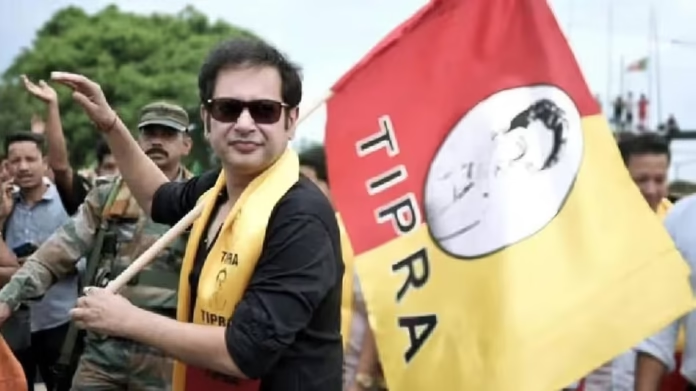Pradyot Kishore Manikya Debbarma, the Royal Scion and Founder of the Tipra Motha Party, launched a fierce criticism against Muhammad Yunus, the Chief Adviser of Bangladesh, on April 1. Yunus’ recent comments regarding the Northeast states of India have sparked outrage, with many Indian leaders and citizens expressing their displeasure. Debbarma, known for his outspoken nature, urged the Government of India to take action with strength, emphasizing the importance of safeguarding the nation’s sovereignty and territorial integrity.
Yunus, who has often been in the spotlight for his social work and advocacy, made remarks that were perceived as contentious, especially in the context of India’s Northeast region. His statement, which seemed to undermine India’s authority over the region, ignited an immediate backlash, not only from political leaders but also from citizens who view such comments as a challenge to the nation’s unity. In response, Debbarma condemned the remarks and questioned Yunus’ understanding of India’s internal matters, particularly those concerning the northeastern states.
The Northeast of India, which comprises eight states, has long been a region marked by its diverse ethnic, cultural, and political landscape. Over the years, the area has witnessed several challenges, including insurgency, ethnic tensions, and demands for autonomy. However, the region has also made significant progress, with the government focusing on development and improved governance. Any external comment that challenges India’s jurisdiction over its northeastern states is seen as an affront to the nation’s sovereignty.
Pradyot Debbarma, representing the indigenous people of Tripura through his Tipra Motha Party, stressed the significance of standing firm against such foreign interference. He called for a unified response from the Indian government, urging it to act decisively in protecting the region’s integrity. Debbarma’s party, which has a significant following in Tripura, has consistently emphasized the need for greater autonomy and recognition of indigenous rights. However, his latest remarks reflect a broader sentiment against any form of external meddling in India’s domestic affairs, especially when it concerns issues as sensitive as territorial sovereignty.
Debbarma’s criticism was not just limited to Yunus but also extended to the broader implications of foreign entities making statements about India’s internal matters. He expressed concern that such comments could embolden separatist movements within the Northeast, which could destabilize the region further. He highlighted that India must take a strong stance against such statements, ensuring that external voices do not interfere with the country’s internal politics and territorial claims.
The Chief Adviser of Bangladesh, Muhammad Yunus, is no stranger to controversy. Known for his work with the Grameen Bank and his advocacy for social change, Yunus has often spoken on global issues, particularly concerning poverty and development. However, his remarks on India’s Northeast have taken a different turn, leading to criticism from various quarters. Many Indian politicians and citizens argue that Yunus should focus on issues within his own country rather than comment on the internal affairs of neighboring nations.
In the wake of the controversy, Debbarma has been vocal on social media, demanding that the Indian government take the necessary diplomatic steps to address Yunus’ remarks. He believes that India should not only issue a formal protest but also make it clear to foreign leaders that interference in its internal matters will not be tolerated. By asserting its strength in the international arena, India would send a clear message about the importance of sovereignty and self-determination.
The statement by Pradyot Debbarma has resonated with many within the region, particularly among those who feel that their voices have been marginalized in the broader national conversation. His call for a robust response from India’s leadership highlights the growing sense of regional pride and the desire to safeguard the rights of the indigenous people of the Northeast.
As the political discourse continues to evolve, it is clear that the issue of external interference will remain a sensitive topic, especially for the states of India’s Northeast. Debbarma’s challenge to Yunus’ remarks is a reflection of the larger debate about India’s global image and its stance on national security and sovereignty. In these turbulent times, political leaders and citizens alike are calling for a unified and strong response to any actions that may threaten India’s unity or its territorial integrity.




